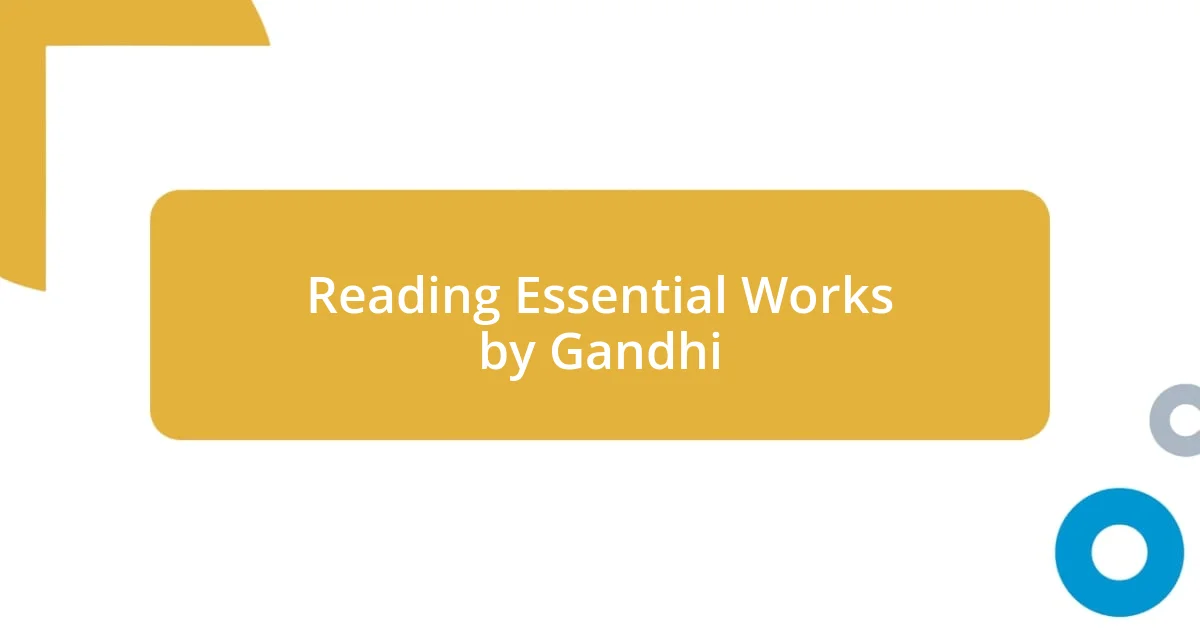Key takeaways:
- Gandhi’s life journey emphasizes the transformation of personal challenges into powerful movements for social change, highlighting the importance of truth and non-violence.
- Key principles of Gandhi’s philosophy include satyagraha (truth-force), ahimsa (non-violence), self-reliance, and universal brotherhood, all encouraging compassion and simplicity in life.
- Gandhi’s teachings have had a global impact, inspiring leaders for social justice and emphasizing the importance of individual responsibility in advocating for change against injustice.

Understanding Gandhi’s Life Journey
Gandhi’s life journey was marked by a deep commitment to truth and non-violence, principles that became the foundation of his philosophy. I often find myself reflecting on how he transformed his personal experiences, like the racial discrimination he faced in South Africa, into powerful catalysts for change. Have you ever faced a challenge that reshaped your perspective? That’s a profound part of what makes his journey resonate so deeply with many of us.
As he evolved from a shy young man into a formidable leader, I can’t help but admire his unwavering dedication to his principles, even under immense pressure. His time in India, especially during the struggle for independence, shows remarkable emotional resilience. It makes me wonder: how would we react today if we were faced with such overwhelming adversity?
The more I learn about Gandhi, the more I see parallels in my own life, such as striving for authenticity and standing up for what I believe in. His journey reminds me that personal integrity can drive societal transformation and inspires me to consider how my own actions might contribute to a larger purpose. Isn’t there something uplifting about knowing that individual journeys can intertwine with the broader fabric of history?

Key Principles of Gandhi’s Philosophy
Gandhi’s philosophy is primarily grounded in the principles of satyagraha, or truth-force, and ahimsa, which means non-violence. I find it fascinating how these concepts are interconnected, encouraging us to seek truth while maintaining compassion towards others. When I think about satyagraha, I often recall moments where I’ve had to stand firm in my beliefs while navigating challenging discussions. It’s these small acts that, like Gandhi teaches, can lead to meaningful change in personal relationships and our communities.
Another pivotal aspect of Gandhi’s teachings is the emphasis on self-reliance and simplicity. This is something I’ve started to embrace in my own life, striving to minimize distractions and focus on what truly matters. Gandhi believed that by simplifying our needs, we could not only liberate ourselves from material attachments but also foster a deeper connection with those around us. Have you ever noticed how less clutter can create a clearer mind? It certainly has worked for me!
Lastly, the idea of universal brotherhood is a cornerstone of Gandhi’s beliefs. He passionately advocated for harmony among all people, irrespective of race and religion. Reflecting on this, I remember instances from my own life where reaching out to someone different from me has fostered understanding and connection. Embracing this principle means recognizing our shared humanity, and it’s something I strive to practice daily, believing that even small gestures can ripple out towards broader societal change.
| Principle | Description |
|---|---|
| Satyagraha | Truth-force; standing firm in truth while using non-violent resistance. |
| Ahimsa | Non-violence; compassion and respect for all living beings. |
| Self-Reliance | Focusing on simplicity and reducing material needs for a clearer purpose. |
| Universal Brotherhood | Promoting harmony among all individuals, irrespective of differences. |

Reading Essential Works by Gandhi
Reading Gandhi’s essential works has profoundly shaped my understanding of his philosophy. I remember sitting under a tree one afternoon, engrossed in The Story of My Experiments with Truth. It was as though Gandhi was speaking directly to me, sharing not just his thoughts but his vulnerabilities. His honesty about his struggles stirred something deep within me, reminding me that we all have layers of complexity, and it’s okay to grapple with them. I find that his writings offer not only ideological guidance but also a sense of companionship for anyone seeking moral clarity.
- *Hind Swaraj:* This work delves into Gandhi’s vision of self-rule and his critiques of Western civilization, challenging readers to rethink notions of freedom.
- *The Story of My Experiments with Truth:* A profound autobiography that illustrates Gandhi’s commitment to truth and self-discovery.
- *Non-Violent Resistance (Satyagraha):* Here, Gandhi outlines the philosophy of non-violence as a powerful tool for social change, making it incredibly relevant today.
- *An Autobiography: The Story of My Experiments with Truth:* It resonates deeply with those of us on a personal journey, inspiring reflection on our paths.
When I came across *Non-Violent Resistance,* I was challenged to examine my responses in conflict situations. I realized that each encounter holds potential for compassion and understanding, an idea I now consciously apply in my daily interactions. It’s remarkable how his work can be a guide for turbulent times, nudging us toward less reaction and more thoughtful engagement. I’m always struck by how his writings encourage us to channel our beliefs into actions that celebrate humanity while honoring our own truths.

Exploring Gandhi’s Impact on Society
Gandhi’s impact on society extends far beyond India; it resonates globally through movements that aspire for social justice and civil rights. I often think about how his principles have inspired iconic leaders like Martin Luther King Jr. and Nelson Mandela, who used non-violence as a powerful weapon against oppression. Can you imagine being part of a protest where, instead of shouting in anger, thousands peacefully gathered for a shared vision of freedom? That’s the legacy Gandhi left behind—demonstrating that strength lies not just in numbers but in unwavering conviction.
In my own experiences, I’ve felt the weight of Gandhi’s teachings during times of societal unrest. I recall attending a community gathering focused on racial equality, where we consciously practiced non-violent communication. Witnessing people from different backgrounds come together to share their stories was profoundly moving. It made me realize that Gandhi’s ideals aren’t just historical concepts; they’re alive and tangible, urging us to confront injustice with grace and insight.
Moreover, Gandhi’s philosophy compels us to question how we can contribute to a more equitable society. Have you ever found yourself at a crossroads, unsure whether to speak up against an injustice? I have, and it was Gandhi’s emphasis on individual responsibility that propelled me to use my voice. By embracing our role as advocates for change, even in small ways, we honor his impact and add to the collective story of humanity striving for peace and understanding.














